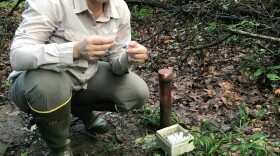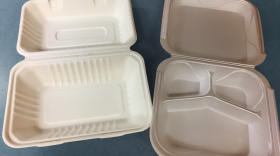
The Environment Report
The Environment Report, hosted by Lester Graham, explores the relationship between the natural world and the everyday lives of people in Michigan.
-
After legal challenges from environmental groups, the U.S. Fish and Wildlife Service has agreed to reconsider its decision to not protect the Kirtland's snake under the Endangered Species Act.
-
Michigan has a pilot program to restore a large wetland area to reduce fertilizer runoff from getting into Lake Erie because it feeds toxic cyanobacterial blooms that spread in the western basin each year.
-
Federal money coming for trees in urban areas, but will local residents have a voice in the process?The U.S. Forest Service is promoting its second round of funding for planting trees in urban areas. Tackling the inequity of how government has not included local communities in discussions about planting trees in their neighborhoods is a priority.
-
Floating solar panels are somewhat new in the U.S. In some places, the competition for land makes putting solar panel on plastic rafts feasible.
-
Audubon Great Lakes members held an advocacy day for the first time in Michigan. Wetlands topped the agenda, but was just one item in a list to improve the environment.
-
The loss and degradation of wetlands has had a profound effect on many birds. There are efforts to restore them, but the rate of loss is greater.
-
The National Science Foundation has given a Marquette, Michigan company a grant to research whether some types of fungi can break down or otherwise destroy PFAS.
-
The second part in a series about waterbirds in the Great Lakes region and the pollutants that are contributing to their population declines.
-
Citizens for Local Choice wants local governments to decide whether solar or wind farms can be built instead of state government.
-
From mosquitoes to sewer overflows, the heat and moisture of a changing climate are creating new health threats in the Great Lakes region, prompting a call to educate residents and doctors about the risks.
-
Methane is one of the big three greenhouse gasses, next to carbon dioxide and nitrous oxide.Peter Groffman is a professor at the City University of New…
-
Dry months of the year have been getting hotter in large parts of the U.S.Felicia Chiang is the lead author of a new study on droughts and climate change,…
-
If you’re out on a lake this summer and you stumble on a blob that looks like an alien life form, it could actually be a good thing.Jo Latimore got an…
-
Asbestos is known to cause cancer. It’s banned for some uses in the U.S., but it’s not entirely banned.The Environmental Protection Agency is proposing a…
-
It’s breeding season for monarch butterflies, and government officials from the U.S., Canada and Mexico want your help collecting data on them.The second…
-
There's a scene in the 1967 film The Graduate where a well-meaning friend of the family pulls Dustin Hoffman's character aside at his graduation party,…
-
The state Legislature is considering bills that would speed up wetland restoration in Michigan.“Wetlands are nature’s answer to a lot of our societal woes…
-
More than 16,000 ticks have arrived in Nate Nieto’s mailbox.He’s an associate professor of microbiology at Northern Arizona University, and he launched a…
-
Wind energy became popular because it can reduce the need for polluting coal and gas generated electricity. But, things are shifting now.“The primary…
-
New tariffs are putting some Michigan newspapers and printers at risk of going out of business.There’s more than a little irony in the fact that a state…




















